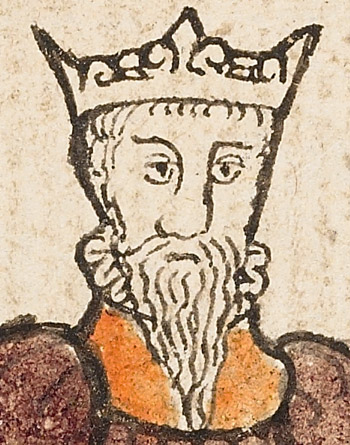Romans of Partenay
General Information
Plot Summary

After a prologue on translation and composition, the poet tells how Raymound, son of a poor earl, is adopted by Amery, Earl of Poitiers. After Amery is killed while the two are hunting, Raymound meets three mysterious sisters by a fountain. The oldest, Melusine, offers to marry him and make him rich, on condition that he does not ask to see her on Saturdays; if he does, he will lose her and his family will be ruined. He agrees and, following her instructions, he acquires a tract of land from Amery’s estate, which Melusine magically enhances. The whole court attends their very lavish wedding, but some express concern that Raymound knows so little about his bride.
Melusine builds cities and castles (including Lusignan, Mel, Parthenay and Rochelle) and bears ten sons, each with distinctive facial features reflecting their supernatural heritage. Uriens (with one red and one grey eye), asymmetrically-eyed Guy, one-eyed Raynold and Anthony (with a claw-like tear on his jaw) are successful in battle against the Saracens, marrying the heiresses of Cyprus, Armenia, Alsace and Luxembourg, respectively. Red-faced Oede marries the daughter of the Earl of Poitiers; Geoffrey, who has one giant tooth, battles giants; and the pious, hairy-nosed Fromont becomes a monk at the abbey of Maillezais. One Saturday, Raymound’s brother persuades him to break his promise and spy on his wife: she is bathing, and is a serpent from the waist down. Raymound conceals his knowledge and they live contentedly until Geoffrey, convinced his brother has dishonoured the family, burns down Fromont’s abbey in a rage. Raymound blames Melusine’s supernatural nature, publicly denouncing her as a ‘serpent’. Aghast at his betrayal, she predicts the downfall of his family line, instructs him to kill their three-eyed son Horrible, and transforms into a winged serpent. She flies away from the castle with a mournful cry, returning secretly at night to nurse their youngest child, Tierry. (Another son, a Raymond junior and ninth in the family line, is mentioned only near the end when he inherits lands.)
Geoffrey goes to Northumberland, where he pursues the giant Grimold into a cave and discovers the tomb of his grandparents. Its inscription tells how King Helmas spied on his fairy wife during childbirth [and was enclosed in the cave by their three daughters. Their mother cursed the sisters: Melusine to be a serpent on Saturdays], Melior to grant the wishes of those who can watch a sparrow-hawk through a three-night vigil, and Palatine to guard their father’s treasure in Aragon. Geoffrey defeats Grimold, releasing his prisoners, and returns to Lusignan, where his brother Raynold tells him about Melusine. Geoffrey kills the uncle who persuaded Raymound to spy on Melior, and his distraught father makes a pilgrimage to Rome, instructing the repentant Geoffrey to rebuild Maillezais. This task begun, Geoffrey goes to Rome to make his confession before the Pope, then visits his father, now a hermit, who dies soon after. Tierry inherits his lands, takes a British wife and begins the line of Parthenay.
The poem turns to Melusine’s sisters, Melior and Palatine. The King of Armenia completes the challenge of the sparrow-hawk, and asks for Melior as his prize. When she reveals that he is descended from Melusine, and that his desire is thus incestuous, he continues to insist: he is beaten and returned home, where his fortunes decline and he dies. Many, including a knight related to Tristan, attempt to win the treasure guarded by Palatine, but are devoured by wild beasts and monsters. Geoffrey, who is now old, hears about the treasure, but falls ill and dies before he can set off: he is buried at the rebuilt abbey of Maillezais. The poet concludes by praising Tierry’s descendents, who include the patron of the (French) romance, John of Partenay, and invoking a litany of saints.
From: The Romans of Partenay or of Lusignen, Otherwise Known as the Tale of Melusine, Ed. W.W. Skeat (London, 1866) EETS o.s.22
Manuscript: Cambridge, Trinity College, MS R.3.17
Manuscripts
Click a title below to search for all romances in that manuscript.